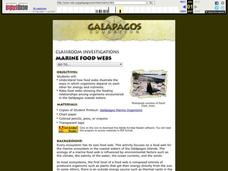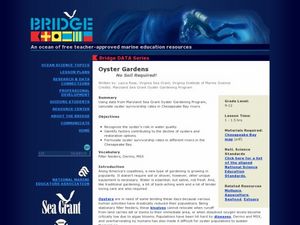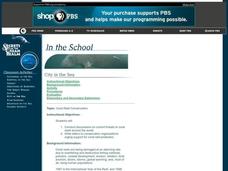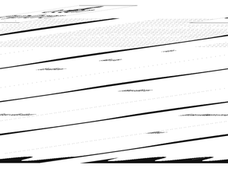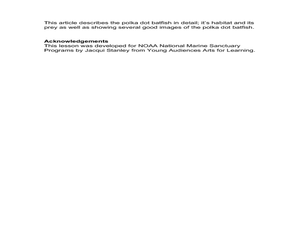Curated OER
To Protect Your Streams, Protect Your Mountains
Students build and experiment with a watershed to understand the effects of pollution. In this movement of water lesson plan, students work in groups creating rock formations and change the viscosity of the liquids falling down the...
Curated OER
Marine Food Webs
Students examine how food webs illustrate the ways in which organisms depend on each other for energy and nutrients, and make food webs showing the feeding relationships among organisms encountered in the Gal??pagos coastal waters.
Curated OER
The Gulf of Maine
Students examine the effect of limiting factors, especially when it comes to human beings. They examine data from the Gulf of Maine area.
National Wildlife Federation
Ghost Town
Around 93 percent of the reefs on Australia's Great Barrier Reef have been bleached, and almost one quarter of them are now dead. Scholars research the sea temperatures, especially around the areas with coral reefs, to make connections...
NOAA
The Dead Zone
The fifth installment of a 23-part NOAA Enrichment in Marine sciences and Oceanography (NEMO) program defines dead zones and how they form. Pupils then examine data from the Gulf of Mexico to determine dead zone formation.
Teach Engineering
Extinction Prevention via Engineering
It's time to save endangered species through engineering. The third lesson in a nine-part Life Science unit has young environmentalists study species extinction. An engaging discussion leads to some ideas on how to use engineering design...
Curated OER
Turning the Tide on Trash: Marine Debris Curriculum
Six different lessons comprise this unit on marine debris. Science, language arts, social studies, and art projects make this an ideal interdisciplinary unit. The result will be well-informed future citizens who can help make a...
Curated OER
Ocean Life
Mini-marine biologists use Scholastic Explorers website to learn about declining numbers of leatherback sea turtles and dusky dolphins. They fill out a K-W-L chart and observation journal worksheet, which are both provided in the lesson...
Curated OER
Oyster Gardens - No Soil Required!
Explore the practice of oyster gardening. Because oysters play a vital role in marine ecosystems and their populations have declined, biologists are transplanting oyster seed to repopulate reefs. After learning about this practice,...
National Wildlife Federation
The Amazing Adventures of Carbon: How Carbon Cycles through the Earth
Here's a stat for your pupils: 18 percent of the human body is carbon! Part 10 in the series of 12 takes pairs on an adventure through the carbon cycle. After a class reading about carbon, pairs read and choose their own adventure...
Consortium for Ocean Science Exploration and Engagement (COSEE)
Understanding the Food Web
Building on prior knowledge of the pervious lesson in the series, pupils explain the previous lesson to each other. Then they write a simple guide for a young child to read on the same topic.
Curated OER
Snow on Sea Ice
High schoolers examine different samples of ice and predict the amount of snow that has fallen in a given year. Using a calculator, they graph the various thicknesses. They analyze the graphs to determine the relationship between the...
Curated OER
Phytoplankton
In this phytoplankton instructional activity, students read and study online information on plankton blooms to answer 8 short answer questions about the topic.
Curated OER
Marine Debris
Pupils perform experiments to examine if debris float, or blow in the wind. The effects of these characteristics on the marine debris are then discussed. They determine how a material can influence what becomes marine debris.
Curated OER
Whale Watcher Game Lesson
Young scholars participate in an online whale watching game. They identify the reasons for migration and describe the route. They make predictions on what would happen if the ways did not migrate.
Curated OER
Coral Reef Conservation
High schoolers conduct discussions on current threats to coral reefs around the world and write letters to conservation organizations urging support for coral reef protection.
Curated OER
Corals & Coral Reefs
Students describe a coral reef, how it is formed and its inhabitants. They explain the ecological and economic importance of coral reefs and discuss its present-day threats. Lesson contains adaptations for all levels.
Curated OER
Fishing for Solutions
Students investigate the many ecological and economic issues related to over fishing the world's marine resources. Working in committees, students research the related topics of equipment and fishing techniques.
Curated OER
Candy Chemosynthesis
Students explain chemosynthesis and photosynthesis using candy. In this chemosynthesis instructional activity, students work cooperatively to create a visual explanation of the chemical equations of photosynthesis and chemosynthesis.
Curated OER
Gone Fishing
Students examine the effects of various methods of fishing on fish populations and biodiversity. They read a handout, participate in a simulation of different fishing methods, record the results, and answer discussion questions.
Curated OER
Food Web Mobile
Students explain the main concepts of food webs and food chains. They
describe the role of animals, plants, and other organisms in cycling energy and matter through a food web by creating mobiles. Lesson contains adaptations for all levels.
Curated OER
Drawing Fish
Students practice creating art by imitating the camouflage of fish. In this animal characteristic lesson, students identify certain fish and their ability to change colors in order to survive in the wild. Students utilize coloring...
Curated OER
The Water Cycle and Global Warming
Students study the flow of water in the environment. In this water cycle lesson students evaluate the consequences of changes in the water cycle using data.
Curated OER
Chewin' in the Chesapeake
Students examine a web page on food webs and select a habitat to research. In this research lesson students identify the organisms found in the food web and present their findings to the class.



